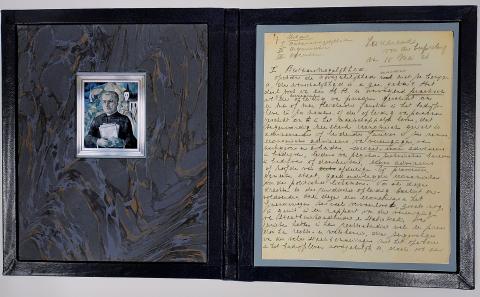Cobbenhagen's blueprint
The first volume of the historiography of Tilburg University, at that time called Katholieke Hogeschool Tilburg, was published in 1978. The author was the historian Hans Bornewasser, full professor of church history at the Theological Faculty from 1967 to 1989. In it, he recounts the first meetings of the economist Martinus Cobbenhagen (1893-1954) with initiators of the academische handelshogeschool (academic college of commerce) that was to be established in Tilburg.
Based on a number of discussions Cobbenhagen had with Thomas Goossens (the first Rector) and board member Pieter van Gils, among others, he drafted a report that Bornewasser characterizes as the "blueprint" for the study program. One of the arguments for this is formed by Cobbenhagen's belief that the college of commerce should become a study program for "socio-economic life in general.” Science should function as a basis for practice but should not become a trade school. This specific orientation led Cobbenhagen to his second main idea. The question was, "Is what is economically right also ethically permissible?" Accordingly, the Hogeschool's first logo included as a motto "ethica - economia.
Cobbenhagen, who was appointed full professor of general theory and history of economics in 1927, saw that these two poles could not be accommodated in one chair: "It is.... desirable not to put economics and morality in one hand because this gives rise to confusion of the objects of these sciences, the task is far too extensive for one person and stands in the way of a proper practice of those sciences." In Cobbenhagen's view, the ideas should be given concrete form by the establishment of a chair “in which the problems of ethics and moral theology are taught according to the principles of S. Thomas" (Thomas Aquinas). In his view, mandatory lectures in ethics and psychology (of commercial life) also belonged in the educational concept.
The ideology cannot be attributed exclusively to Cobbenhagen. Hendrik Kaag (1897-1970), also a full professor from the very beginning, also wanted, more than elsewhere, general-theoretical economics and business economics to be practiced in each other's line. With such views, he saw Tilburg already in a connection with Harvard and the London School of Economics, among others.
Tilburg principles were also reflected in the Maandschrift Economie (Monthly Magazine of Economics), founded in 1935. Until World War II, more than a third of all articles focused on social reordering and its political implications. Moreover, Cobbenhagen emphasized the importance of the academic community, which, in his view, consisted not only of staff and students but also of those in the field, the alumni.

The 'blueprint' of education by Martinus Cobbenhangen, see als here (pictured above)
More about history and academic heritage
The Tilburg University academic heritage is a very diverse set of archives, visual materials, collections, devices, recorded stories, et cetera that relate to the history of the university.